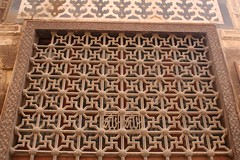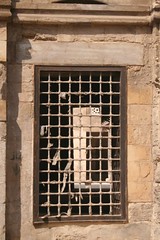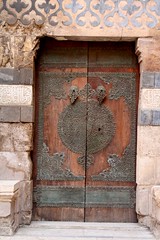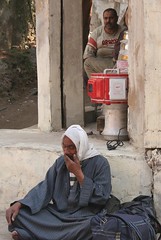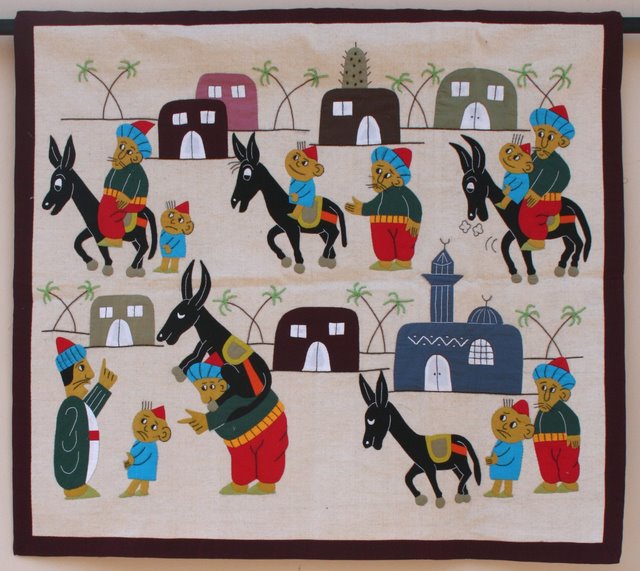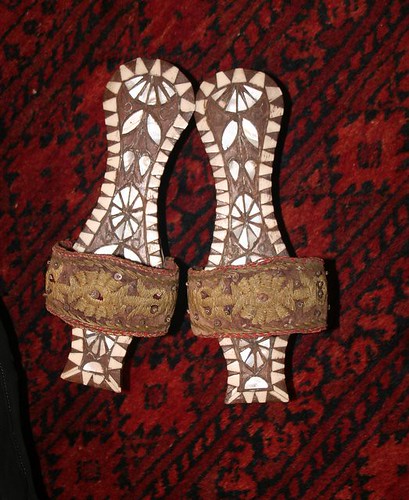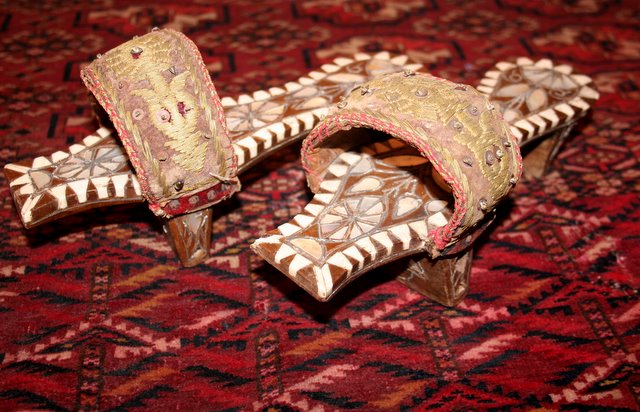Gilf Kebir and Jebel Uweinat - the Trip of a Lifetime
 Tuesday, November 27, 2007 at 05:57AM
Tuesday, November 27, 2007 at 05:57AM Bear with me - there is so much to tell. I have done so many other things since I last wrote. I have taught in Bangkok in Thailand, stood on top of a mountain of ten million ounces of gold down near Marsa Alam at Sukari - the Centamin gold mine, been to teach at the mecca of quilters - Quilt Festival at Houston in Texas, and now I have done something I have been burning to do since I came to Egypt.
Gilf Kebir was made famous by the book and movie, The English Patient. In an opening scene a Bedouin wanders into a cave and is spellbound by the images on the walls. Later the hero takes the heroine there too, and it is here that she dies, surrounded by images of Swimmers. From the moment I realised that the Cave of the Swimmers existed, and was in Egypt, I have wanted to go there.
Now I have been. Of all the things I saw the only thing that was a real disappointment was the Cave of the Swimmers - but more later on that. Blame Hollywood for going for evocative imagery rather than the truth!
Day One
On 10th November a group of three Swiss, two Germans, and one Australian left the International Hot Springs Hotel to go to Gilf Kebir and Jebel Uweinat. With us went a guide, and two other drivers, and a young Captain from the Egyptian Army, and two Italians in their own vehicle. We faced fourteen days of travel, twelve in the desert with desert camps, not toilets or showers for twelve days. Wet Ones, I was quietly told, were the secret of desert hygiene. I stocked up in Houston - or rather, two friends bought them for me. We had agreed over Texas barbecue in Goodes that panti-liners might be good too, as we were only allowed one small bag each and a small rucksack for stuff that needed to be with us in the cars. I packed camera equipment, watercolours, in hope, and a small diary.

Meet Marita, Jean Daniel, Irene, Helena, Heide, Mahmoud, our guide, Peter and Miharu, the organisers from the Hot Spring International Hotel (who did not come) and me. Alberto and Yvonne must have been packing their car and will appear later.
From my diary.
Dipping into the first drop into the Bahariya Oasis we left the sun above us and while it still picked out the gilded tops of the mesas above us our world dropped into mauves and lilacs with the abruptness of diving underwater.
Diary.
In a car redolent with the heavy perfume of guava, the light freshness of orange rinds and the orange leaves which are crushed under the green gold fruit we left for Dakhla. The desert seems featureless and pale, washed clean and over-bleached. Shadows of the white wind-formed shapes in the desert are coppery on the sand dunes, and and indigo against the cobalt winter sky. Fingers of pale sand have crept across the road, and can be a jolt like an abrupt road hump if you hit them unexpectantly.
... mud domes, smokey taupe against the pale sky, and the sky afloat with black crows, seven then nine. 'Seven for a secret that will never be told', but I cannot remember nine.... The Farafra Oasis wraps more along the road that Bahariya with sudden stretches of vegetation, more vegetables and market gardens, and less dates. There are farmers with donkey carts, children with donkeys, farmers with hand carts - all type of carts, pulled by people or animals or other vehicles. There are bright ochre box-shaped houses with bright green doors tucked under eucalyptus so green and perfect that they could not possibly be growing in Australia where insects chew every second leaf.
There are men with guns, in galabeyiahs, and in police and army uniform. We pull up before the checkpoint and the drivers hand out the licences, IDs and permission slips for the desert.
There is a hitch. The drivers pull the cars to the shade of the trees and wander inside the small check point office. We are supposed to have our escorting officer, but have arranged to collect him in Dakhla and they do not like it.
Our driver, Hani, comes out and starts the car and whirls into the small and dusty township of Farafra. We are puzzled as the others have not joined us. He jumps from the car, moving from one shop to another. He is asking for something but shopkeepers are all shaking their heads. He drives the car further along and starts the same thing, We are puzzled but decide while he is hopping to climb out and buy cigarette lighters. None of us smoke but it seems that we need to carry a plastic bag for used toilet paper and wet ones (how basic can you get?), which we keep till the end of the day then burn. We have all agreed that a lighter would work better than matches in a breezy desert landscape.
While asking at one shop for our lighters Hani rushes past and says "I come back', then took off in a cloud of dust. This is really odd and we cannot work out what is going on. We stand uneasily at the side of the road and after about five minutes later he returns and the tale unfolds.
Mahmoud, our guide, has had his licence confiscated. In many countries this would mean an immediate halt to the expedition. Here, he pays 20 pounds Egyptian for a piece of paper to cover him for one week. In fact we will be in the desert for twelve days, but that is a problem for later.
The officer checking the paperwork had asked for tea. Mahmoud politely told him that we had some but that it was at the bottom of all the packing and he was sorry, but it was too hard to get it out. The officer said he was willing to wait while they unpacked. Mahmoud said he was not willing to unpack or to keep the group waiting. The officer said that he was willing to wait and that he could keep the group waiting anyway. Then the officer said it was a pity then that he had too much on top of his car. In fact - the other cars were all packed higher! Mahmoud made the mistake of pointing out three other vehicles that had just gone through the checkpoint with much higher loads.
It was at this point that Hani had rushed out saying he would find tea. The officer only gave him ten minutes and the town was three minutes drive away - and the town was, it seems, out of tea.
So - Mahmoud's licence was taken. Hani was muttering under his breathe as we left the oasis and I recognised 'sharmouta' - very rude in Arabic, and basically meaning slut! It is quite a popular name for female cats.
We had lunch under date palms somewhere past Farafra. The drivers flipped a striped rug out on the ground and set up thick sliced tomato - it is incredible in Egypt - with salty white cheese spread on it, and stuffed cabbage leaves with a spiced rice filling, small eggplants fried whole and split and spread with a pounded mix of peppers, both hot and the capsicum variety, and garlic, with lemon and oil and salt and pepper. With it we had rough brown oasis bread - it was a feast. It was followed by sliced guava which we also ate with the bread.
By the time we drove into Dakla it was night and dozens - hundreds probably - of donkeys were trip-trapping home. Loads varied - huge loads of fodder reached from one side of the road almost to another with cars squeezing past and a driver perched on top, and loads of wood caught against the oncoming headlights like a lattice of black lace. A trailer, badly loaded and driven, veered from side to side, effectively blocking the road. I once, in Africa, faced an angry male elephant with a similar sway, but he was facing us. Our driver squeezed past with some risk to both the trailer and our vehicle and got a rude sign from the driver - funny how those are almost universal. And Hani again shouted 'Sharmouta'.
We checked into the Oasis Hotel and Camp and it was the last night in a room, with a shower, or with a toilet. Dinner was in the restaurant of the hotel - with the small disadvantage that my legs were seen as a smorgasbord for about twenty hungry mosquitoes.
I washed my hair very well next morning knowing it was the last time for twelve days.






